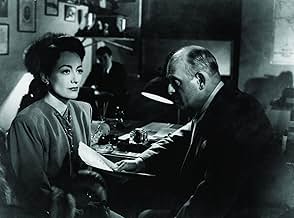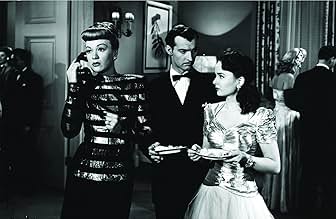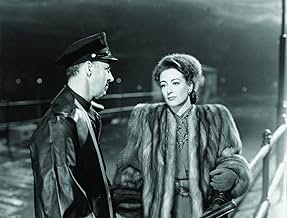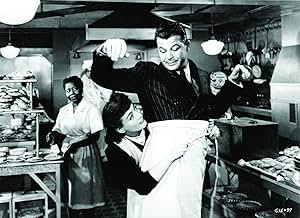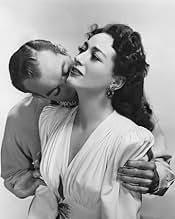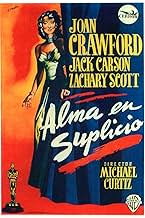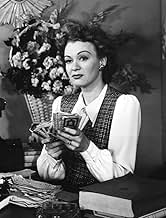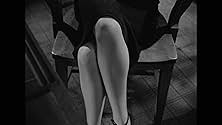IMDb-BEWERTUNG
7,9/10
30.380
IHRE BEWERTUNG
Eine hart arbeitende Mutter steuert auf eine Katastrophe zu, als sie sich von ihrem Ehemann scheiden lässt und ein erfolgreiches Restaurant eröffnet, um ihre verwöhnte Tochter zu unterstütze... Alles lesenEine hart arbeitende Mutter steuert auf eine Katastrophe zu, als sie sich von ihrem Ehemann scheiden lässt und ein erfolgreiches Restaurant eröffnet, um ihre verwöhnte Tochter zu unterstützen.Eine hart arbeitende Mutter steuert auf eine Katastrophe zu, als sie sich von ihrem Ehemann scheiden lässt und ein erfolgreiches Restaurant eröffnet, um ihre verwöhnte Tochter zu unterstützen.
- 1 Oscar gewonnen
- 3 Gewinne & 7 Nominierungen insgesamt
Bill Alcorn
- Soldier
- (Nicht genannt)
Betty Alexander
- Party Guest
- (Nicht genannt)
Ramsay Ames
- Party Guest
- (Nicht genannt)
George Anderson
- Peterson's Assistant
- (Nicht genannt)
James Anderson
- Diner Customer
- (Nicht genannt)
Robert Arthur
- High School Boy
- (Nicht genannt)
Lynn Baggett
- Waitress
- (Nicht genannt)
Leah Baird
- Police Matron
- (Nicht genannt)
Zusammenfassung
Reviewers say 'Mildred Pierce' is acclaimed for its strong female lead, complex dynamics, and themes of maternal love and social class. Joan Crawford's Oscar-winning performance is celebrated, and the film's noir elements are noted. However, some find the pacing slow and melodrama excessive, with Veda's character criticized. Despite this, it's seen as a classic with significant historical portrayal of women's roles.
Empfohlene Bewertungen
Joan Crawford plays the title role, a mother who will do anything for her selfish daughter Veda, played by Ann Blyth. Mildred even goes into business, becoming a successful restaurant owner, but Veda is still ungrateful even as her mother has provided her opportunities in society.
Jack Carson plays Wally Fay, a man Mildred manipulates; Zachary Scott is Monte Beragon, another who gets involved in a tragic love triangle of sorts with Crawford's and Blyth's characters. Eve Arden plays Ida Corwin, a friend of Mildred's who later becomes one of her employees, that gets to say some great sassy lines including "Personally, Veda's convinced me that alligators have the right idea. They eat their young."
Eventually, the daughter gets herself in deep trouble and the mother's sacrifice is made even greater. Directed by Michael Curtiz, and based on the James M. Cain novel with a screenplay by Ranald MacDougall, this essential drama also features Bruce Bennett, Lee Patrick, Veda Ann Borg, and Butterfly McQueen (uncredited).
Joan Crawford's Academy Award winning Best Actress performance on her first (!) of three nominations. Also Supporting Actress Oscar nominations for Arden (her only!) and Blyth (her only as well). The film, its B&W Cinematography, and MacDougall's (his only) screenplay were also nominated. Added to the National Film Registry in 1996.
Jack Carson plays Wally Fay, a man Mildred manipulates; Zachary Scott is Monte Beragon, another who gets involved in a tragic love triangle of sorts with Crawford's and Blyth's characters. Eve Arden plays Ida Corwin, a friend of Mildred's who later becomes one of her employees, that gets to say some great sassy lines including "Personally, Veda's convinced me that alligators have the right idea. They eat their young."
Eventually, the daughter gets herself in deep trouble and the mother's sacrifice is made even greater. Directed by Michael Curtiz, and based on the James M. Cain novel with a screenplay by Ranald MacDougall, this essential drama also features Bruce Bennett, Lee Patrick, Veda Ann Borg, and Butterfly McQueen (uncredited).
Joan Crawford's Academy Award winning Best Actress performance on her first (!) of three nominations. Also Supporting Actress Oscar nominations for Arden (her only!) and Blyth (her only as well). The film, its B&W Cinematography, and MacDougall's (his only) screenplay were also nominated. Added to the National Film Registry in 1996.
The characterization of film noire is applied to certain films that touch on the grittier, more cynical aspects of life. This genre is typified as having lead roles played by strong, solemn male characters, in this respect, Mildred Pierce is an exception. In all other ways Mildred Pierce follows the model for a great film noire. The main character encounters both success and crushing emotional hardships, which the viewer gets to see the effects of. The supporting characters do a wonderful job depicting deceit in action, and each individual character contributes moving specific parts of the film along. The film ends with somewhat of an untied knot, and the viewer could certainly learn to love Mildred as the epitome of a "tragic hero". The film starts with a mystery and works it's way backwards, and as you can assume the viewer imagines he/she knows what is going on, when clearly the writer has us at his whims. Great acting. Great tragedy. Great film noire.
Joan Crawford won the Academy Award for Best Actress for her portrayal of the title character in this 1945 offering by Warner Brothers. Ms. Crawford was in her prime then and members of my generation, who remember her in films such as 1968's Berserk and 1970's Trog, are sometimes surprised to learn how attractive and talented she was in her heyday. The mean-spirited commentary of her life which we have been subjected to since her death in 1977 notwithstanding, still there was a certain hard edge to her personality which shown through in her screen roles. That she was able to win filmdom's greatest prize by playing a willing victim and vulnerable woman is perhaps the greatest tribute to her abilities as an artist. At any rate, she was the star of this film noir classic, a story that holds up well after 57 years. Mildred Pierce was an ordinary housewife of the era. No skills, relied on her husband for sustenance and leadership and was crushed when he ditched her for another woman. Her daughters were her whole life, doting unhealthily on Veda, the older one, especially (a very young Ann Blyth, herself nominated for Best Supporting Actress for this film). But, Veda was a schemer, conniver and social climber from the word go and it was ultimately her actions which brought an interesting human interest story to a thunderous climax. The story fascinates as we see Crawford, through iron will and determination, become an independent, successful business woman even as she makes tragic error after tragic error in her personal life. Mildred Pierce really is a rare animal, as it truly is more of a human interest story than any other in the film noir genre. The cast is great: Jack Carson, outstanding as Mildred's lifelong friend and would-be suitor, Bruce Bennett as Mildred's nice but weak-willed husband, Zachary Scott as the caddish successor to Bruce Bennett for Mildred's affections, and Eve Arden (still another nomination for Best Supporting Actress) in one of her trademark roles as a no nonsense gal pal. In Mildred Pierce, we have murder, love, misguided love, love not reciprocated, jealousy, misunderstanding, and good intentions/bad results. Could it be this film is so intriguing because we see in our own lives one or more of these very human conditions?
James M Cain's novel 'Mildred Pierce' was much tougher, dirtier, violent and cynical than the gorgeously mounted movie it became, but the film still manages to maintain enough of the flavor of the book to be interesting. The portrait of working class life in Southern California works well, as does the depiction of a marriage that breaks down because of disappointment and resentment rather than anything melodramatic. Within its first hour MILDRED PIERCE captures something anxious about American life and marriages and families that is more true than most of what movies had shown up to that time, and it would prove to be even more so in the postwar world to come. The movie actually becomes more false and synthetic as it moves into Mildred's rise in life, but by then the plot and characters have taken hold.
And so has the film's increasingly bleak look at what women can expect when they live and work alone in a man's world, beset by men who want to exploit them, sexually and otherwise. This too, though softened from the book, would have seemed refreshingly frank to many of viewers at that time.
What raises the film to the level of classic is the first class work from every professional in every department. Joan Crawford is not much more expressive here than she was in her later MGM pictures, but this character suits her limited talents so well that she seems better than in almost anything else she did. All her Warners pictures used her more effectively than MGM usually managed to do, perhaps because in them she is invariably exploited, abused, maligned, even tortured. The bad behavior her Warners characters inspire in others is so extreme that she doesn't need to be. These plots do what Adrian's sometimes garish clothes did for her at MGM: they give her a personality, make her seem more interesting than she really was, and they make her sympathetic despite her essential coldness. Crawford gets able support from Ann Blyth, Eve Arden (as comedy relief; she is almost appearing in another movie entirely), Zachary Scott and especially Jack Carson, dead-on as a sweaty hustler and low rent lothario, bringing nuance to what could have been a one-note portrayal. Bruce Bennett isn't really a good actor in the role of Mildred's first husband, but he's perfectly cast -- he looks like an Okie from one of Dorothea Lange's photographs who went west to 'make it' and never did.
And as has been frequently mentioned here, Ernest Haller's cinematography (especially in the brilliant prints now being shown on cable) is consistently evocative and beautiful. So many of his shots live in the memory: in the scene where a mink wearing, gun wielding Mildred comes upon Monte and Vida kissing, the image is an almost primal one of betrayal and glamor -- the way their profiles are in darkness, the way Ann Blyth arches back against the bar, the hard, dim glitter of lame and the billows of tulle from her gown. The way Vida tumbles forward into almost blinding lamplight while Monte's face hardens behind her -- these are the kinds of wonderful images the best old films regularly delivered. Also excellent is Anton Grot's art direction, opulent but still managing to help create the particular SoCal atmosphere of this picture. And as usual, Max Steiner's score is effective, but as an earlier poster noted, he recycled a couple of motifs from his Oscar-winning score to NOW, VOYAGER. And director Michael Curtiz must be praised for keeping everything in perfect balance. This is one of the most admired '40s pictures and well worth a look.
And so has the film's increasingly bleak look at what women can expect when they live and work alone in a man's world, beset by men who want to exploit them, sexually and otherwise. This too, though softened from the book, would have seemed refreshingly frank to many of viewers at that time.
What raises the film to the level of classic is the first class work from every professional in every department. Joan Crawford is not much more expressive here than she was in her later MGM pictures, but this character suits her limited talents so well that she seems better than in almost anything else she did. All her Warners pictures used her more effectively than MGM usually managed to do, perhaps because in them she is invariably exploited, abused, maligned, even tortured. The bad behavior her Warners characters inspire in others is so extreme that she doesn't need to be. These plots do what Adrian's sometimes garish clothes did for her at MGM: they give her a personality, make her seem more interesting than she really was, and they make her sympathetic despite her essential coldness. Crawford gets able support from Ann Blyth, Eve Arden (as comedy relief; she is almost appearing in another movie entirely), Zachary Scott and especially Jack Carson, dead-on as a sweaty hustler and low rent lothario, bringing nuance to what could have been a one-note portrayal. Bruce Bennett isn't really a good actor in the role of Mildred's first husband, but he's perfectly cast -- he looks like an Okie from one of Dorothea Lange's photographs who went west to 'make it' and never did.
And as has been frequently mentioned here, Ernest Haller's cinematography (especially in the brilliant prints now being shown on cable) is consistently evocative and beautiful. So many of his shots live in the memory: in the scene where a mink wearing, gun wielding Mildred comes upon Monte and Vida kissing, the image is an almost primal one of betrayal and glamor -- the way their profiles are in darkness, the way Ann Blyth arches back against the bar, the hard, dim glitter of lame and the billows of tulle from her gown. The way Vida tumbles forward into almost blinding lamplight while Monte's face hardens behind her -- these are the kinds of wonderful images the best old films regularly delivered. Also excellent is Anton Grot's art direction, opulent but still managing to help create the particular SoCal atmosphere of this picture. And as usual, Max Steiner's score is effective, but as an earlier poster noted, he recycled a couple of motifs from his Oscar-winning score to NOW, VOYAGER. And director Michael Curtiz must be praised for keeping everything in perfect balance. This is one of the most admired '40s pictures and well worth a look.
Joan Crawford's tour-de-force as a self-sacrificing mother is a real stunner. Directed by Michael Curtiz, and based on James M.Cain's steamy novel, "Mildred Pierce" is a slick stylish sudser that ranks among the best.
After a decade-long streak at MGM, Crawford, made her way over to Warner Bros. It was a brilliant move as Crawford won an Oscar (as Mildred) and ended up back on top.
As the title character, Crawford brings a sense of steely determination and guts. As a devoted housewife, Mildred puts the needs of her family first. So when her husband (Bruce Bennett) begins a sleazy affair with a woman down the street, Mildred kicks him out and starts life anew. Nothing - not even one daughter's death and another daughter's selfishness - stops Mildred from working her way to the top. She goes from waitress in a greasy diner to the wealthy owner of a successful restaurant chain. But despite her achievements, Mildred must contend with a slimy lover (Zachary Scott) and her increasingly vile and spoiled daughter, Veda (Ann Blyth). All the drama comes to a rousing climax, which culminates in a physical altercation between brat and mom.
Crawford's gut-wrenchingly sympathetic performance draws you in, and the sparks that she and the wonderful Blyth create are unforgettable. Also, a playful Eve Arden as Mildred's pal, spouts off some terrific dialogue.
"Mildred Pierce" is an exceptional piece of work that uses some of the finest elements of classic cinema. The story moves along at a sleek pace, and thanks to the writers, "Mildred" never sinks in the froth of its own soapiness. A powerful, emotional cinematic experience.
After a decade-long streak at MGM, Crawford, made her way over to Warner Bros. It was a brilliant move as Crawford won an Oscar (as Mildred) and ended up back on top.
As the title character, Crawford brings a sense of steely determination and guts. As a devoted housewife, Mildred puts the needs of her family first. So when her husband (Bruce Bennett) begins a sleazy affair with a woman down the street, Mildred kicks him out and starts life anew. Nothing - not even one daughter's death and another daughter's selfishness - stops Mildred from working her way to the top. She goes from waitress in a greasy diner to the wealthy owner of a successful restaurant chain. But despite her achievements, Mildred must contend with a slimy lover (Zachary Scott) and her increasingly vile and spoiled daughter, Veda (Ann Blyth). All the drama comes to a rousing climax, which culminates in a physical altercation between brat and mom.
Crawford's gut-wrenchingly sympathetic performance draws you in, and the sparks that she and the wonderful Blyth create are unforgettable. Also, a playful Eve Arden as Mildred's pal, spouts off some terrific dialogue.
"Mildred Pierce" is an exceptional piece of work that uses some of the finest elements of classic cinema. The story moves along at a sleek pace, and thanks to the writers, "Mildred" never sinks in the froth of its own soapiness. A powerful, emotional cinematic experience.
Wusstest du schon
- WissenswertesAfter seeing the film, James M. Cain sent Joan Crawford a signed first edition of the original novel. The inscription read: "To Joan Crawford, who brought Mildred Pierce to life just as I had always hoped she would be, and who has my lifelong gratitude."
- PatzerMildred's house on Corvallis Street in Glendale is shown as a one-story Spanish-style bungalow; however, the interior has a staircase leading to the bedrooms.
- Zitate
Ida Corwin: [to Wally about his lustful looks in her direction] Leave something on me. I might catch cold.
- Crazy CreditsThe opening credits are presented with a background ocean scene that "washes" the credits on the screen.
- Alternative VersionenAlso shown in computer colorized version.
- VerbindungenFeatured in Hollywoods goldene Jahre, Teil 2: Die große Zeit des Tonfilms (1962)
- SoundtracksYou Must Have Been a Beautiful Baby
(uncredited)
Music by Harry Warren
Lyrics by Johnny Mercer
Played and sung at Wally's club toward the beginning
Also played when Veda and Ted are at Wally's club
Top-Auswahl
Melde dich zum Bewerten an und greife auf die Watchlist für personalisierte Empfehlungen zu.
- How long is Mildred Pierce?Powered by Alexa
Details
Box Office
- Budget
- 1.453.000 $ (geschätzt)
- Weltweiter Bruttoertrag
- 11.751 $
- Laufzeit
- 1 Std. 51 Min.(111 min)
- Farbe
- Seitenverhältnis
- 1.37 : 1
Zu dieser Seite beitragen
Bearbeitung vorschlagen oder fehlenden Inhalt hinzufügen




